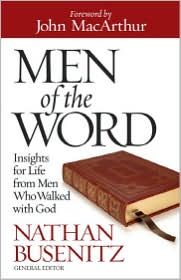 The aim of Men of the Word is to paint a biblical portrait of manhood. Rather than appealing to a culturally driven, testosterone imbibed view of what makes a man”™s man, Men of the Word (MOTW) defines qualities of masculinity from biblical biographies. Nathan Busenitz, a former personal assistant to John MacArthur, and current faculty member of The Master”™s Seminary, edits the book. A staff member of Grace Community Church in Sun Valley, California writes each chapter.
The aim of Men of the Word is to paint a biblical portrait of manhood. Rather than appealing to a culturally driven, testosterone imbibed view of what makes a man”™s man, Men of the Word (MOTW) defines qualities of masculinity from biblical biographies. Nathan Busenitz, a former personal assistant to John MacArthur, and current faculty member of The Master”™s Seminary, edits the book. A staff member of Grace Community Church in Sun Valley, California writes each chapter.
Using the lives of men such as Abraham, Solomon, Josiah, Elijah, Timothy, David, Daniel, Nehemiah, Peter, Elisha, and Paul, MOTW biblically chronicles God”™s expectations for men. While the focus of and a few of the applications within the book are primarily for men, these character studies are actually well-written expositions that would benefit anyone.
The qualities highlighted in MOTW include what it means to live by faith, find satisfaction in God, treasure God”™s word, pray, worship, fight temptation, repent of sin, stand firm against compromise, lead with courage, love your spouse, shepherd your family, work hard, love your enemies, share the gospel, love the church, and pursue purity. The book also contains some brief questions related to each chapter that would make the book well suited for a small group or men”™s Bible study discussion. If readers desire quick references to biblical passages addressing any of the main subjects of the book, a “Biblical Reference Guide” is included at the end.
Highlights for me include John Martin”™s chapter on worship. With John being an accomplished musician, it was refreshing to see worship defined beyond music. His chapter describes lessons from Israel”™s hymn writers and is an excellent description of biblically driven worship. This chapter would benefit anyone and is a helpful addition to the contemporary buzz about music and worship.
Austin Duncan”™s chapter on lesson from the Proverbs about hard work was engaging, convicting, challenging, and stimulating in thinking through a biblical approach to diligence. I also appreciated Jim Pile”™s excellent discussion of the principles involved in how men should shepherd their families. It is well written from a man who has given many years of his own life to letting Scripture drive how he has led his family. Bill Shannon”™s chapter is an excellent review of how to pursue sexual purity. Why it is listed as an appendix and not an actual chapter is puzzling ““ it is just as substantive and helpful as any in the book.
If you are looking for a solid, Bible soaked study to challenge men to think biblically about their lives, Men of the Word is a title you should readily to include in your plans. It is not overly technical and thoroughly Scriptural. I eagerly recommend it.







